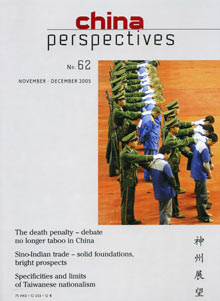
China Perspectives No. 62
- Special Feature
- Article
- Book Reviews
The Debate Over the Death Penalty in Today's China
Despite the sensitivity of the subject, the death penalty is currently a topic of public discussion among Chinese legal experts who are now openly wondering about its possible abolition. This debate is of interest on three counts. First, it goes hand-in-hand with a retrospective reading of the Chinese penal tradition, highlighting the succession of attempts at modernising criminal law for over a century. It also shows the ever present weight of the Maoist legacy and the contradictions of the present policy, caught between a concern for legality and continuing recourse to exceptional measures. Lastly, legal professionals and theorists alike are engaging in a reviewbased on specific casesof the particular features of contemporary Chinese society and culture.
Country People Moving to the Cities: The Migratory Dynamic
This article examines the migration of rural workers towards the cities in the light of national data on the two periods 1985-1990 and 1990-1995. It briefly considers the restrictions on workers' mobility, focusing particularly on the main instrument of control, the hukou. The article highlights the finding that despite such continuing obstacles to mobility, the migratory dynamic is consistent with the deepening integration of the Chinese domestic market.
China-India Bilateral Trade: Strong Fundamentals, Bright Future
Booming bilateral trade has come to be the strongest pillar of China-India rapprochement. This has not only since overtaken the pace of political confidence-building but also has a substantial impact on their mutual perceptions. Their border trade has especially brought about a noticeable transformation in their remote and problematic border regions. This has contributed to overall tranquillity and peace in the area and has as well facilitated progress in their border negotiations.
This boom in trade has also introduced new trends. The two states are no longer only recipients on foreign direct investment but have entered into a new phase of being investors, both mutually as in other regions. In this new context, the increasing deficit in the energy sector and the competition to capture new markets present major challenges to sustaining this boom in their bilateral trade.
Social Problems in Macau
This article examines the current social problems in Macauinequalities, problems in urban housing, traffic and transportation, air pollution, crime and deviant behaviour, and education. It does not focus on one social problem in detail; rather, it attempts to offer a broad picture of the issues from a sociological perspective. To help solve these problems, it seems that Macau has to build a stronger civil society and continue to democratise its political system. How Macau deals with these problems will determine the identity that people in Macau want to build for themselves.
Frank Dikötter, Lars Laamann, Zhou Xun, Narcotic Culture. A History of Drugs in China
Dru C. Gladney, Dislocating China. Muslims, Minorities, and Other Subaltern Subjects
Christian Taillard (ed.), Intégrations régionales en Asie orientale Philippe Pelletier (ed.), Identités territoriales en Asie orientale
Joseph Y. S. Cheng (ed.), Guangdong. Preparing for the WTO Challenge
Erika E. S. Evasdottir, Obedient Autonomy. Chinese Intellectuals and the Achievement of Orderly Life
Ko-lin Chin, Heijin. Organized Crime, Business and Politics in Taiwan


